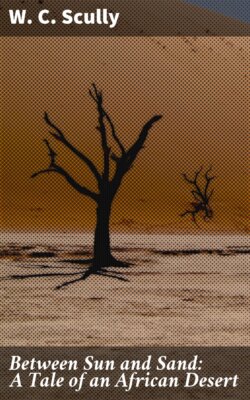Читать книгу Between Sun and Sand: A Tale of an African Desert - W. C. Scully - Страница 9
На сайте Литреса книга снята с продажи.
Max.
ОглавлениеMax Steinmetz stood in the doorway of the little iron shanty at Namies, which was built near the foot of a kopje about three hundred yards from the Hattingh camp. Above his head was a signboard bearing the legend: “Nathan Steinmetz, Allegemene Handelaar.” (General dealer.) He looked out over the wide, wide Desert and watched the smoke-like courses of the violent gusts against which a thunderstorm was labouring from the north-east. The unsavoury odour of half-dried hides assailed his nostrils; the ramshackle iron roof rattled to the blasts over his head. The season was February, and the tortured plains glowed with absorbed heat like Milton’s burning marl.
Over the intermittent moaning and howling of the wind could be heard, at intervals, the mutterings of thunder. The Desert now became a roaring blast-furnace, fanned by the sand-laden gusts which raged fiercer and ever fiercer. Max closed the door and barred it from the inside. A few gouts of rain began to thud on the roof. Then a jagged shaft of lightning shot from the zenith, shattered itself into coruscating splinters against some tempest-packed sheaf of air, and seemed to fill the universe with a blinding blaze. At the same instant the winds were stunned by a crash so awful that the solid earth reeled from the shock. Then came the rain in dense, white, lashing waves, and in a few moments the wide plain became a hissing sea.
The storm-cloud rolled away as quickly as it had come, leaving only a few torn wisps of fleecy cloud to mark its wake. Through these the purified sky seemed to open in vaults of azure that pierced the infinite. For a short time the sun flooded the plain with gold and rubies; then it sank, and the cool, quickening evening died in peaceful splendour in the transfigured west.
The storm over, Max opened the door and stepped outside. His first glance was towards the Hattingh camp. Then he brought a chair and a book out of the shop and sat down where, pretending to read, he could look over the top of the page in the same direction. Soon afterwards Susannah came out of the mat-house and superintended the lighting of a fire by the Hottentot maid in the kitchen-scherm, the bushes of which, scattered by the storm, had been rearranged. She had discarded her cappie, and her luxuriant black hair was blown about by the moist breeze. She gave one hurried glance towards the shop and then stood with her back towards it. Max saw this and, in his inexperience, felt saddened.
Max had a face which, had Raphael seen it through the bars of the Ghetto gate at Rome, would have made him take pains to secure the young Jew as a model. It was one of those faces which one only—and that but very rarely—sees in the youth of Israel. Its shape was a pure oval. The skin was a clear olive, and the eyes were large, dark, and melting. His jet-black hair clustered over a broad, low forehead, and his full, red lips were arched like the bow of the Sun-God. As yet the stress of trade had not awakened the ancestral greed which would one day dominate his blood and modify his physiognomy. Small in stature and of perfect symmetry, he did not give one the idea of possessing either strength or activity; in feet he looked like a languorous human exotic who had strayed from the canvas of some “Old Master” whose brush was dedicated to physical beauty. His age was twenty-one, but he looked several years younger.
Max was a clerk at a very small salary in the employ of his brother Nathan. The business was a paying one, but the carrying of it on involved extremely hard work. Nathan spent most of his time in moving about from camp to camp among the Trek-Boers and the half-breeds who dwelt among the saltpans in the central and southern portions of the Desert. He travelled with a small, strong cart, which was drawn by six hardy but debilitated-looking donkeys. His practice was to leave Namies with a load of hucksters’ merchandise and to return, generally about two months afterwards, with a quantity of ostrich feathers. The Desert abounded in wild ostriches which, although protected by law, were ruthlessly hunted down for the sake of their feathers. There was, of course, a certain risk of discovery involved, and this would have been followed by heavy penalties, but Nathan was prepared to take this risk for the sake of the large profits which he made. The feathers of the wild ostrich fetch a much higher price than those of the domesticated bird. In many of the waste places of South Africa the protecting law is often but a name. Nathan knew that the risk of his being convicted was very small. Just now he was absent upon a trip, but his return was daily expected. In the meantime Max had charge of the store.
Nathan and Max were orphans, and had been brought up by an uncle—a pawnbroker of the East End of London. Their parents were German Jews who had settled in England. They had no brothers or sisters. Eight years previously the uncle had given Nathan a hundred pounds and sent him to the Cape to seek his fortune. Four years afterwards Max followed. In the meantime Nathan had made a little money as a “smouse,” or hawker. With Max’s assistance he was able to extend his operations considerably. For the first two years the younger brother had worked without any salary; then, at the instance of the uncle, who made particular inquiries upon the point, Max was given a small stipend.
